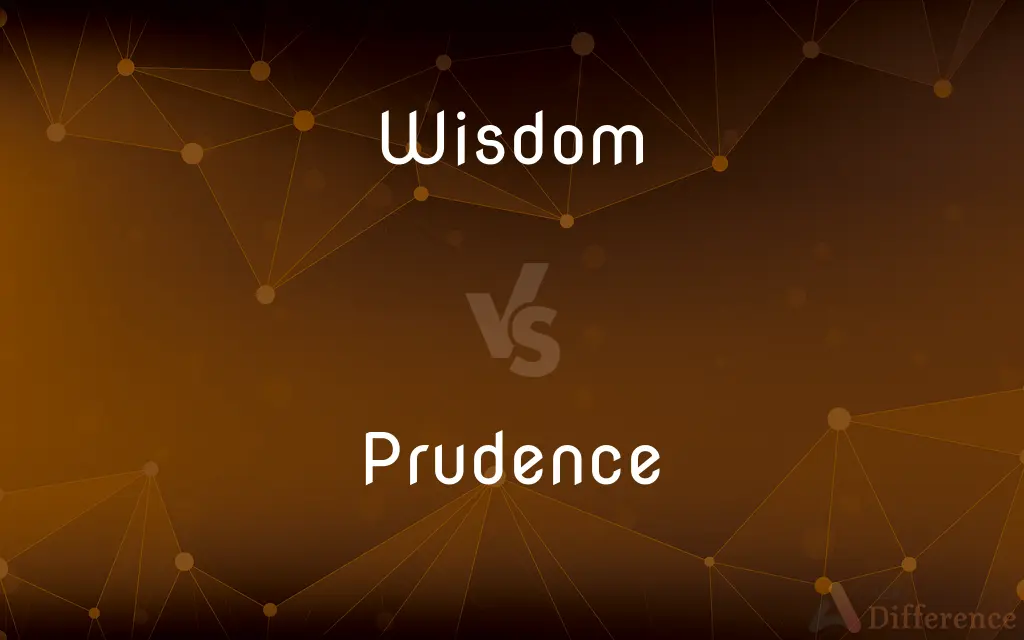Wisdom vs. Prudence — What's the Difference?
By Fiza Rafique & Maham Liaqat — Updated on April 8, 2024
Wisdom encompasses deep understanding, insight, and judgment applied across various situations, while prudence focuses on cautiousness and practical judgment in specific circumstances.

Difference Between Wisdom and Prudence
Table of Contents
ADVERTISEMENT
Key Differences
Wisdom is recognized as a comprehensive understanding and deep insight that guides thoughts, behaviors, and actions in a wide range of situations. It involves the application of knowledge, experience, and deep understanding to achieve a desirable outcome, often associated with the ability to make sound judgments and decisions. On the other hand, prudence is more specifically related to being cautious and exercising forethought and discretion in practical matters. It emphasizes careful management of risks and thoughtful consideration of future consequences in decision-making processes.
While wisdom is often seen as a broader, more encompassing virtue that includes aspects of ethics, morality, and profound understanding of life, prudence is considered a subset of wisdom that deals specifically with the practical application of thoughtful judgment to avoid harm and achieve beneficial results. Wisdom involves a deep understanding of people, objects, events, and situations, enabling individuals to act in ways that are morally and ethically sound. Prudence, however, is more narrowly focused on the practical aspects of decisions, emphasizing caution and avoidance of risk.
Wisdom is typically acquired over a lifetime of experiences and is often associated with a deep understanding of the human condition, empathy, and a reflective approach to life’s challenges. It allows for a broad perspective on life’s complexities, enabling wise individuals to make decisions that consider the well-being of others as well as themselves. Prudence, by contrast, can be seen as a practical skill or habit that can be developed through thoughtful practice and learning from experiences, specifically in the context of decision-making and future planning.
Both wisdom and prudence play important roles in guiding ethical behavior and decision-making. While wisdom provides the foundation for understanding the principles that govern life and human nature, prudence offers a practical approach to applying these principles in day-to-day activities. This distinction highlights the complementary nature of wisdom and prudence in achieving a well-rounded, virtuous life.
Comparison Chart
Definition
Deep understanding and insight applied broadly.
Cautiousness and practical judgment in specifics.
ADVERTISEMENT
Scope
Broad, encompassing various aspects of life.
Narrow, focused on practical decision-making.
Associated With
Ethics, morality, life’s complexities.
Risk management, future consequences.
Acquisition
Through diverse experiences and reflection.
Through practice and learning from specific experiences.
Focus
Understanding human nature, ethical actions.
Careful consideration of actions and their outcomes.
Compare with Definitions
Wisdom
The quality of having experience, knowledge, and good judgment.
His wisdom was sought after by everyone in the village.
Prudence
Careful management of resources.
His prudence ensured the family's financial stability.
Wisdom
Deep understanding that informs life’s decisions.
Wisdom led her to a decision that benefited everyone involved.
Prudence
Sagacity or shrewdness in the management of affairs.
Prudence was her guide in negotiating deals.
Wisdom
Insight into the true nature of things.
Through wisdom, he saw beyond the surface.
Prudence
The act of being prudent, cautious, and wise in practical affairs.
Prudence dictated a conservative approach to investment.
Wisdom
The ability to discern inner qualities and relationships.
Her wisdom was evident in her thoughtful responses.
Prudence
The quality of being careful and avoiding risks.
His prudence was apparent in his cautious driving.
Wisdom
Knowledge of what is true or right coupled with just judgment.
Wisdom guided his choice in a complex situation.
Prudence
The ability to govern and discipline oneself by the use of reason.
She showed prudence in avoiding unnecessary risks.
Wisdom
Wisdom, sapience, or sagacity is the ability to think and act using knowledge, experience, understanding, common sense and insight. Wisdom is associated with attributes such as unbiased judgment, compassion, experiential self-knowledge, self-transcendence and non-attachment, and virtues such as ethics and benevolence.Wisdom has been defined in many different ways, including several distinct approaches to assess the characteristics attributed to wisdom.
Prudence
Prudence (Latin: prudentia, contracted from providentia meaning "seeing ahead, sagacity") is the ability to govern and discipline oneself by the use of reason. It is classically considered to be a virtue, and in particular one of the four Cardinal virtues (which are, with the three theological virtues, part of the seven virtues).
Wisdom
The ability to discern or judge what is true, right, or lasting; insight.
Prudence
The quality of being prudent; cautiousness
We need to exercise prudence in such important matters
Wisdom
Common sense; good judgment
"It is a characteristic of wisdom not to do desperate things" (Henry David Thoreau).
Prudence
Careful or wise in handling practical matters; exercising good judgment or common sense
A prudent manager of money.
Wisdom
The sum of learning through the ages; knowledge
"In those homely sayings was couched the collective wisdom of generations" (Maya Angelou).
Prudence
Characterized by or resulting from care or wisdom in practical matters or in planning for the future
A prudent investment.
Wisdom
Wise teachings of the ancient sages.
Prudence
The quality or state of being prudent
Wisdom
A wise outlook, plan, or course of action.
Prudence
Economy; frugality.
Wisdom
Wisdom(Bible) Wisdom of Solomon.
Prudence
The quality or state of being prudent; wisdom in the way of caution and provision; discretion; carefulness; hence, also, economy; frugality.
Prudence is principally in reference to actions to be done, and due means, order, seasons, and method of doing or not doing.
Prudence supposes the value of the end to be assumed, and refers only to the adaptation of the means. It is the relation of right means for given ends.
Wisdom
(uncountable) An element of personal character that enables one to distinguish the wise from the unwise.
Prudence
Discretion in practical affairs
Wisdom
(countable) A piece of wise advice.
Prudence
Knowing how to avoid embarrassment or distress;
The servants showed great tact and discretion
Wisdom
The discretionary use of knowledge for the greatest good.
Wisdom
The ability to apply relevant knowledge in an insightful way, especially to different situations from that in which the knowledge was gained.
Wisdom
The ability to make a decision based on the combination of knowledge, experience, and intuitive understanding.
Wisdom
(theology) The ability to know and apply spiritual truths.
Wisdom
(rare) A group of wombats.
Wisdom
(rare) A group of owls.
Wisdom
The quality of being wise; knowledge, and the capacity to make due use of it; knowledge of the best ends and the best means; discernment and judgment; discretion; sagacity; skill; dexterity.
We speak also not in wise words of man's wisdom, but in the doctrine of the spirit.
Behold, the fear of the Lord, that is wisdom; and to depart from evil is understanding.
It is hoped that our rulers will act with dignity and wisdom that they will yield everything to reason, and refuse everything to force.
Common sense in an uncommon degree is what the world calls wisdom.
Wisdom
The results of wise judgments; scientific or practical truth; acquired knowledge; erudition.
Moses was learned in all the wisdom of the Egyptians, and was mighty in words and in deeds.
Knowledge and wisdom, far from being one,Have ofttimes no connection. Knowledge dwellsIn heads replete with thoughts of other men;Wisdom, in minds attentive to their own.Knowledge, a rude, unprofitable mass,The mere materials with which wisdom builds,Till smoothed, and squared, and fitted to its place,Does but encumber whom it seems to enrich.Knowledge is proud that he has learned so much;Wisdom is humble that he knows no more.
Wisdom
Accumulated knowledge or erudition or enlightenment
Wisdom
The trait of utilizing knowledge and experience with common sense and insight
Wisdom
Ability to apply knowledge or experience or understanding or common sense and insight
Wisdom
The quality of being prudent and sensible
Wisdom
An Apocryphal book consisting mainly of a meditation on wisdom; although ascribed to Solomon it was probably written in the first century BC
Common Curiosities
Why is wisdom considered a virtue?
Wisdom is considered a virtue because it represents the culmination of knowledge, experience, and ethical judgment, contributing to the well-being of oneself and others.
What is the main difference between wisdom and prudence?
The main difference is scope: wisdom applies to a broad understanding of life and ethical decision-making, while prudence focuses on cautious and practical judgment in specific circumstances.
How can prudence be developed?
Prudence can be developed through careful reflection on past experiences, learning from the consequences of actions, and applying this knowledge to future decisions.
How do wisdom and prudence interact in leadership?
In leadership, wisdom provides the vision and ethical guidance, while prudence ensures decisions are executed with caution and foresight for the long-term benefit.
Are there situations where prudence is not advisable?
While prudence generally involves careful judgment, excessive caution can sometimes hinder necessary risks or innovative actions.
Can you be wise without being prudent?
While wisdom encompasses a broad range of virtues including prudence, one can be considered wise in a general sense but may not always act prudently in specific situations.
Can prudence lead to success?
Yes, prudence can lead to success by guiding individuals to make careful, well-considered decisions that manage risks effectively and plan for future well-being.
Can wisdom be taught?
While the foundational elements of wisdom can be shared, true wisdom is often considered to be acquired through personal experience and reflection.
Do wisdom and prudence change with age?
Both wisdom and prudence typically grow with age, as individuals accumulate more life experiences from which to draw insights and learn lessons.
How do cultural perceptions of wisdom and prudence differ?
Cultural perceptions can vary, with some cultures placing a higher emphasis on communal wisdom or collective prudence, while others may value individual insight and caution.
Can a decision be prudent but not wise?
Yes, a decision can be considered prudent in a narrow sense, focusing on immediate benefits or risks, but not wise if it overlooks broader ethical implications.
How do wisdom and prudence affect decision-making?
Wisdom provides the ethical and moral foundation for decision-making, while prudence offers a practical framework for applying these decisions cautiously and effectively.
Is prudence valued in all professions?
While prudence is generally valued, the extent to which it is prioritized can vary depending on the nature of the profession and the specific risks involved.
Is wisdom always beneficial?
While wisdom is generally seen as beneficial, the application of wisdom depends on the context and the ethical framework of the individual, and its benefits can vary.
Can wisdom be detrimental if misapplied?
Misapplied wisdom, where insights are used inappropriately or without ethical consideration, can lead to negative outcomes.
Share Your Discovery

Previous Comparison
Chav vs. Emo
Next Comparison
Sullen vs. SurlyAuthor Spotlight
Written by
Fiza RafiqueFiza Rafique is a skilled content writer at AskDifference.com, where she meticulously refines and enhances written pieces. Drawing from her vast editorial expertise, Fiza ensures clarity, accuracy, and precision in every article. Passionate about language, she continually seeks to elevate the quality of content for readers worldwide.
Co-written by
Maham Liaqat














































